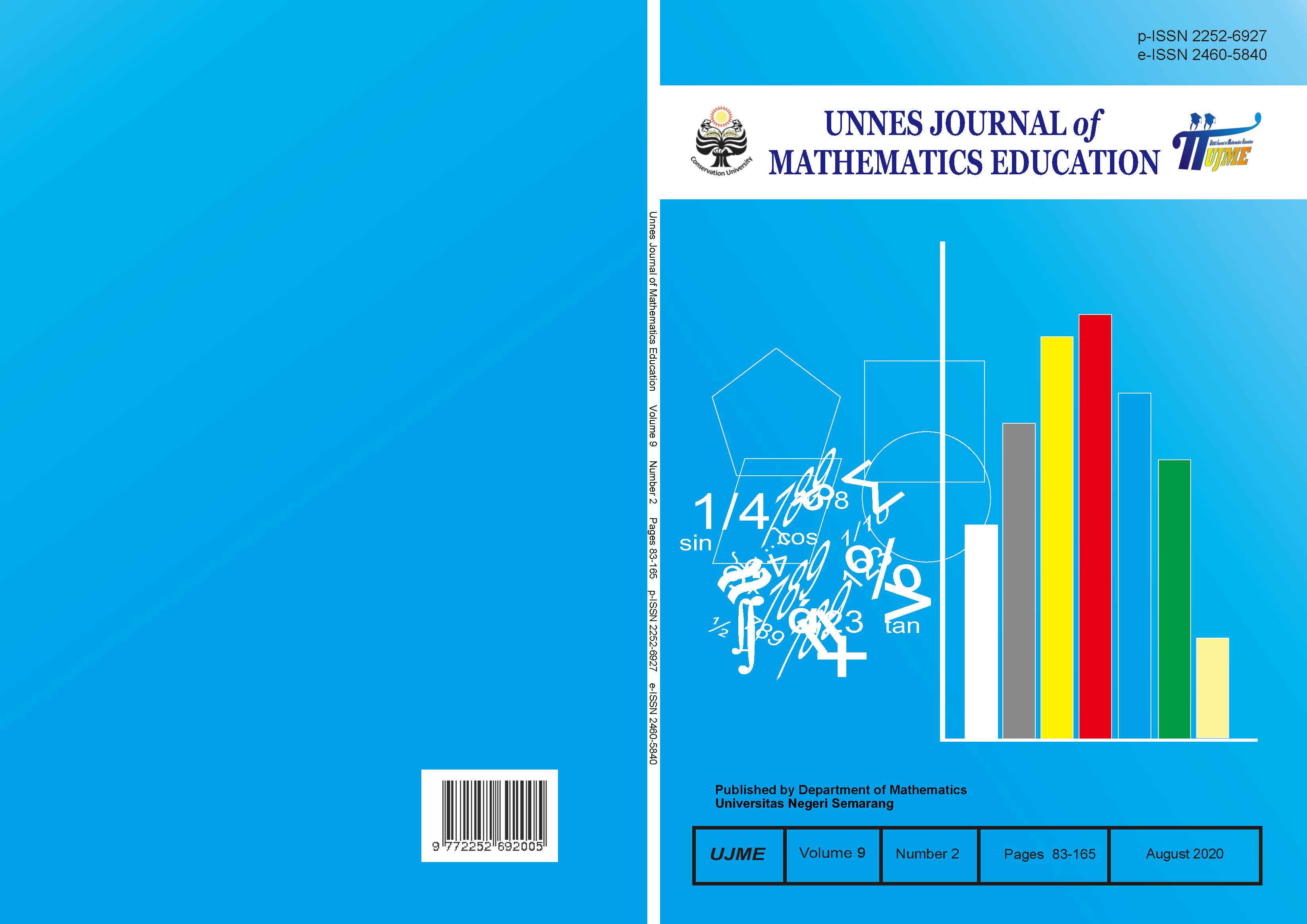The growth of mathematical imagination of students of a deaf school when learning using Problem-Based Learning assisted by manipulative teaching aids
##plugins.themes.academic_pro.article.main##
Abstract
The ability of mathematical imagination is important in daily life for children with deaf disabilities. One effort to foster mathematical imagination is through a problem-based learning model assisted by manipulative props. This study aimed to: (1) find out whether the results of the mathematical imagination final test of deaf students with the application of the Problem-Based Learning assisted by manipulative props are better that the results of the initial test; (2) describe the mathematical imagination of the deaf students; (3) find out the growth of mathematical imagination of the deaf students. This research was mixed-method research that used a sequential exploratory design with a one-group pretest-posttest design. The population of this research was the students of a special school for disabilities (SMALBN) in Salatiga, Indonesia, while the sample was a random class from the 11th classes. The method used in this research were observation, documentation, tests, and interviews. Quantitative analysis showed that the final test of mathematical imagination result was better than the results of the initial test. Qualitative analysis yield a description of mathematical imagination that included aspects such as scientific sensitivity, scientific creativity, and good scientific productivity. The scientific sensitivity aspect of the imagination growth before learning was good, and the scientific creativity aspect was quite good. After learning, it was obtained that scientific sensitivity, scientific creativity, scientific productivity were good. The study concluded that problem-based learning assisted by manipulative props could foster the ability of mathematical imagination of deaf students in 11th grade.
##plugins.themes.academic_pro.article.details##
References
Arends, R.I. 2012. Learning to Teach. New York: Mc Graw-Hill, Companies, Inc.
Aziz, A. N., Sugiman, & Prabowo, A. 2015. Analisis Proses Pembelajaran Matematika pada Anak Berkebutuhan Khusus (ABK) Slow Learner di Kelas Inklusif SMP Negeri 7 Salatiga. Jurnal Matematika Kreatif- Inovatif, 6(2) : 111-120.
Depdiknas.2003.Undang-Undang Republik Indonesia Nomor 20 tahun 2003 tentang Sistem Pendidikan Nasional.Jakarta: Depdiknas.
Gunadi, A. A. Pengaruh Lingkungan Sosial terhadap Imajinasi Anak. 2017. Journal Refleksi Edukatika, 7(2).
Kosasih, E. 2014. Strategi Belajar dan Pembelajaran Implementasi Kurikulum 2013. Bandung: Yrama Widya.
Mariya, D., Zaenuri, & E. Pujiastuti. 2013. Keefektifan Pembelajaran Model Savi Berbantuan Alat Peraga terhadap Kemampuan Pemecahan Masalah. Unnes Journal of Mathematics Education, 2(2): 40-47.
Mun, Jiyeong. Dkk. 2015. Exploration of Korean Students’ Scrientific Imagination Using the Scientific Imagination Inventory. International Journal of Science Education. Vol 37, No13.
Pujiastuti, E., & Mashuri. 2017. Making a Math Teaching Aids of Junior High School Based on Scientific Approach Though on Integrated and Sustainable Taining. Journal of Physics. International Conference on Mathematics. 1(824). 1-6. doi:10.1088/1742-6596/8/24/1/012053.
Pujiastuti, E., Mulyono, & Soedjoko, E. 2018. Pengungkapan Koneksi Matematis Sebagai Sarana Penelusuran Kemampuan dan Proses Pemecahan Masalah Peserta Didik. Prosiding Seminar Nasional Matematika. Semarang: Universitas Negeri Semarang.
Satoto, S., Sutarto, H., & Pujiastuti, E. 2013. Analisis Kesalahan Hasil Belajar Siswa dalam Menyelesaikan Soal dengan Prosedur Newman. Unnes Journal of Mathematics Education, 1(2).
Sudijana. 2008. Pengantar Statistik Pendidikan. Jakarta: Grafindo.
Sugiman, Suyitno, H., & Mulyono. 2018. Profil Kemampuan Matematis Siswa SLB di Jawa Tengah Berdasarkan Hasil Ujian Nasional Matematika. Prosiding Seminar Nasional Matematika. Semarang: Universitas Negeri Semarang.
UU Nomor 8 Tahun 2016. Penyandang Disabilitas.
Vygotsky, L. S. (1930, 2003). Imagination and Creativity in Childhood. Journal of Russian and East European Psychology, 42(1), 7-97.
